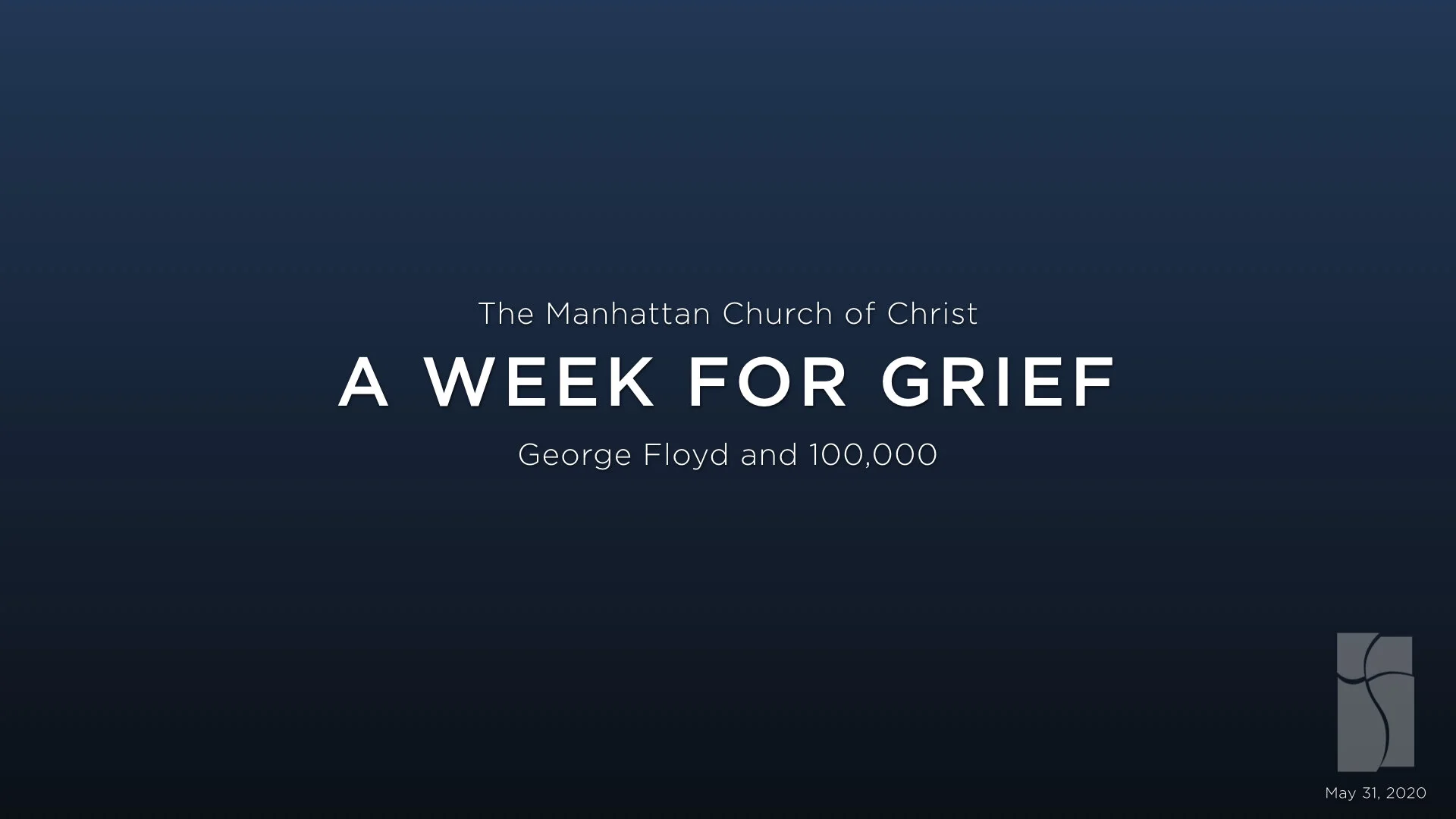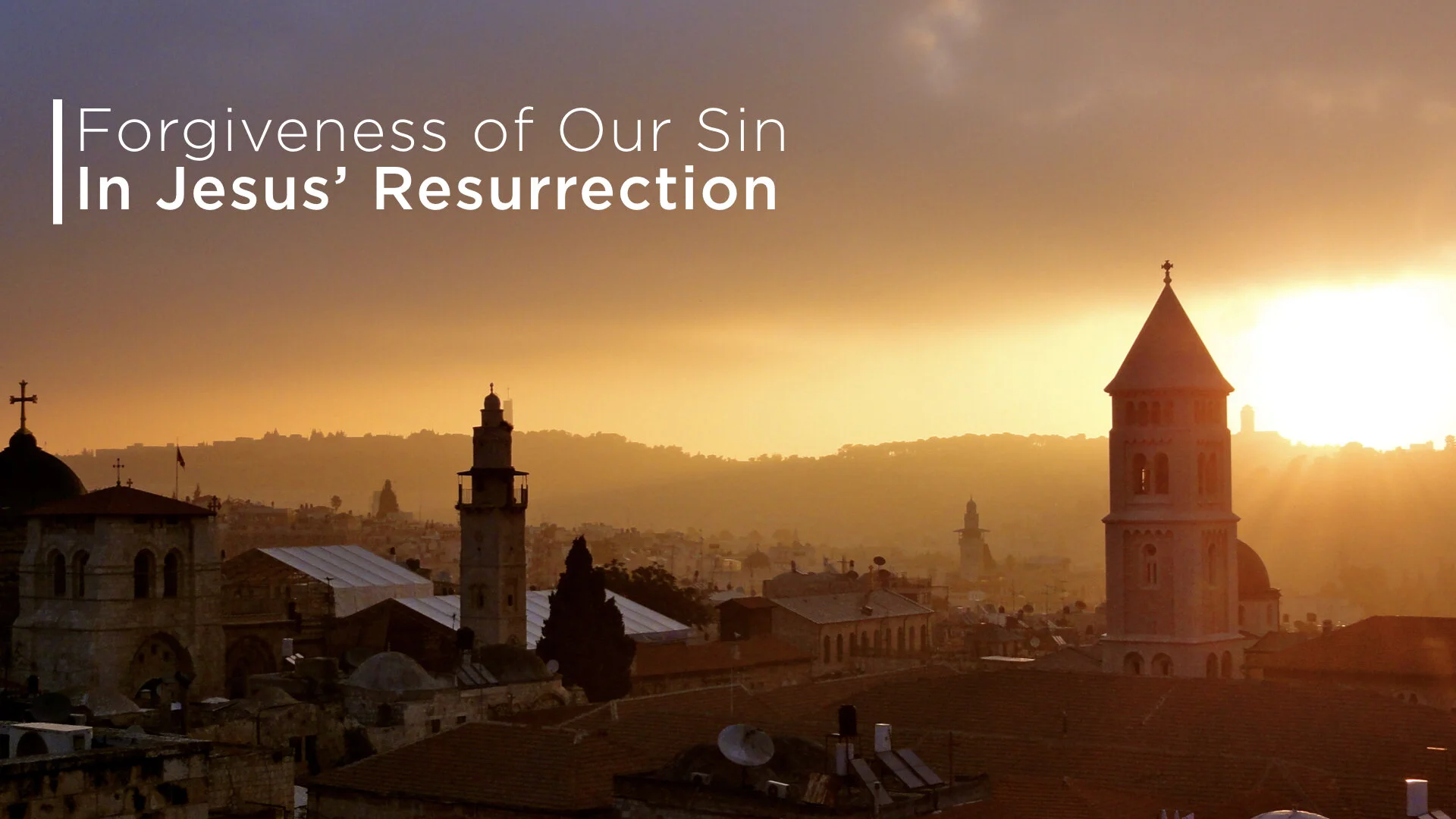Breaking Free from Lies that Enslave Us
Moving Toward a God of Love
The title of this series is “Life with a God of Love.” As we meditate on the words of John, we’re being led through a series of spiraling reflections toward the great affirmations in the 4th chapter that “God is Love!” (4:8, 16).
John wants us to grasp not just a slogan, but an insight into all reality.
This is the heart of everything.
It’s why there is a world, why we’re here,
why we have hope and confidence even in the midst of a pandemic,
why the irrationality of so much that we humans do in the world is not the final verdict on reality.
Why the world and our lives can have hope, beauty, creativity, nobility, justice. Why we keep seeking all these things.
John knows that his readers in the 1st century certainly felt the hostility of the world around them in the Roman empire.
That most of the world did not share their faith, their hope, their love.
He knows that there was then (and now) a great urge to move toward pessimism. Toward cynicism. Just look around. Everything’s messed up. We had Caligula, we had Nero. Now we’re under the thumb of Domitian. It just gets worse and worse.
But John wants to call them back to see more clearly the message of the gospel, the announcement of what God has done in Jesus in all its beauty and depth.
The way it unites both the highest spirituality – God is light and no darkness –
and the most concrete physicality – the blood of Jesus in his crucifixion.
That’s where he started.
It doesn’t look away from the brokenness and sin of us humans. Every one of us.
But it sees that God takes on that problem in Jesus in a way that surprising and that never gives up on us even when we fail.
That this work is not just aimed at you and me but as the deep sin of the whole world.
John’s very clear that God’s work in us is a process. John loves verbs like walking, holding on, abiding. Especially abiding.
We abide in what Jesus said right from the start about love and transformation.
It works. We find ourselves participating in God’s life
Walking in God’s light.
Abiding in God’s love.
We live the full range of life. Receiving life as little children, Acting as responsible adults, growing as young people finding new strength.
We little humans actually become children of the God of the Universe. Living toward a future that is beyond our imagination because it is in God’s creative hands, a creation of his unlimited love.
Too good to be true? Absolutely! But true? John says, Yes, indeed!
That’s why John emphasizes that what he’s talking about is a challenging learning process. He talks about how unexpected things become clearly manifest, how we come to know, come to understand, recognize things. How we learn to see and experience “truth,” “reality” not within the cynicism created by imperial power but in the reality of the Love of God that pervades all that exists.
Doing What’s Wrong; Doing What’s Right
John tells us that that cynicism that says we’re trapped in what’s fundamentally wrong, in sin, and you just go with it because it’s the only way to success in this world.
That’s slander about human life from the slanderer (diabolos). It’s not true.
It doesn’t fill you with joy in this life and it blows away instantly with death.
Right now you can live a life that fills you with joy now and that is as unending as the very life of God.
Freedom When We Are Closed In
Philippians 1:12-27
What does it mean to be confined as a Christian? This week Tom draws a parallel from Paul's time under house arrest and the current social distancing that we are all experiencing.
Leadership for a Community Under Challenge
Reading from a Distance – to Understand and Follow Paul writes to Timothy in c. 67 after 2 yrs house-arrest in Rome, travel to Spain and back to Aegean area. After Rome’s fire in 64, Nero’s slaughter of Christians in Rome, made it illegal to be a Christian in the Roman empire. Paul urges them to stay engaged by Faith-Gospel but to pray for emperor and for quiet life with honor. Christians vulnerable to accusation and execution. We read from our modern post-Christendom, individualism, freedom, more ignored than physically endangered. Our tradition often reads this text as a check-list of laws for church elders. Challenges in crossing centuries: Givens of Greco-Roman society (1) Patriarchy in law (2) Honor- shame culture based in evaluation of others, (3) Patronage, (4) Polytheism. Christian faith was threatened on all these fronts. People breathed this given reality as they organized life.
Why to Timothy and Titus, who’ve work with Paul 15+ yrs in difficult situations. Don’t they know? Why should overseers be married? Paul earlier (1 Cor 7) urged staying unmarried, like himself. Why so much about accusation, conflict, honor and so little about spiritual gifts as earlier. Why must pagans speak well of the overseer? Who is the “accuser” (diabolos, devil, human)? To understand the language, it helps to understand what’s at stake, what Paul is trying to do. Paul knows Timothy and Titus know the spiritual gifts needed for leadership (Rm 12, 1Cor 12...). He focuses on particular needs for leadership in the troubled churches in Ephesus and Crete.
Men & Women Learning to Pray
Praying for a Quiet, Active Life Under a Threatening Empire. Reading scripture challenges our imagination and empathy. Or does it? Is Paul writing to his co-worker Timothy and instructing him by stating the ideal arrangements of the church? Nero began persecution of Christians in Rome after fire. No systematic official persecution. But being a Christian was illegal and anyone could bring accusation. Permission to kill. Hard vulnerability. What does a community do? Still pray for the emperor? Withdraw from public life? How can we fulfill our principal mission? How can we live by the Gospel in a world of honor and shame. There was also the vivid danger of a Heresy that focused on myths and speculation instead of Faith. Semi-Gnostic withdrawal: We are those who know our Divine inner reality. The physical is corrupt. Avoid marriage and giving birth to more flesh. Women, young widows were especially attracted. Men, fairly simple. Pray for emperor and quiet life. But stay quiet: Don’t show anger, dispute.
Worship to Embrace a World
Being True to the Gospel under Powerful Threats. Reading scripture challenges our imagination and empathy, to put ourselves back in the situation of the writer and readers and hear the words as they heard them. Scripture is more than that, but it begins there. This text can seem bland or obsequious when read from a comfortable setting in modern times. But it is a text that affirms God’s heart expressed in worship in a time of vast uncertainty and threat, both from powers and divergent teaching. Put yourself in Ephesus, Roman provincial capital, about 3 years after Nero killed Christians in Rome after a great fire. [Tacitus] Things had been hard, but now the empire has given permission to denounce Christians and execute them. Some want to turn inward to become a group that doesn’t engage the world but focuses on special knowledge, speculation, and myth. Paul challenges Timothy to guide the community in prayer precisely for their fiercest enemies. What does it mean to Pray for All People and for the Emperor? Rome’s empire and politics were highly stratified. Christian communities had no ordinary power. They were too different to be incorporated into Rome’s “tolerant” paganism. But they could have railed against it. Instead, Paul draws on Jesus’ teaching to urge God’s inclusive vision.
A Broken Sinner, Called by God
Paul’s Guidance for Timothy in Difficult Times The setting is after the times described in Acts. Paul has been in Rome. Perhaps traveled to Spain. Now back in the area of Greece and Asia Mino, as he never expected. Dealing with problems in Crete and Ephesus in perhaps 66-68. Perhaps drafted by a co-worker. (1Pt 5:12). Paul has a rich relationship with Timothy, beginning in Lystra about 20 yrs earlier, 1st journey. Mother Eunice, grandmother Lois converted. Timothy, with gift, joins Paul on 2nd journey. Timothy, Paul’s emissary to Macedonia and Corinth. Dealing with persecution, challenges. The Engagement of Faith versus the Withdrawal of Speculation Things have changed. Nero is emperor. After fire in Rome. Beginning of execution of Christians. Many discouraged, withdrawing (Heb 12:4, 12). Paul had experienced the arbitrary violence of Roman magistrates. Now, no official ban, but clear permission to harass and execute. It’s important to grasp the effect of the threat of execution. Paul wants them to live exemplary lives serving and loving all so that opponents won’t be able to say anything bad about them.
Confident Life in the Generosity of God
God’s Choice of Generous Grace Jesus taught farmers and fishermen about treasures in God’s realm, serving God and Mammon, and choosing not to be anxious about life. Paul gave us the example of persecuted, impoverished believers overflowing with simple generosity. It’s hard to relate. We in the US are well-off in the world at large but most of us don’t feel rich enough to be generous. We like generosity. Henry Ford or Bill Gates makes a pile of money, sets up a foundation, becomes “good,” a benefactor. We learn generosity as a function of wealth. That’s “love of honor” (a payoff) not simple generosity. The striking thing in the NT is Generosity of the Poor, not for any glory but to learn God’s grace by simply seeing and helping the needs of others. There’s no virtue in poverty nor any necessary evil in wealth, but there’s danger in both. Dispair and rage, corrupt power, blindness to others, etc. All along the spectrum, we learn that Mammon saves. God’s grace draws us to see simple, non-manipulative generosity as a core of life for everyone no matter what their circumstances. Seek to share in the practice of Grace!
The Generosity of Grace
ar hearing Jesus’ teaching about serving God and Mammon and about being anxious about life. How can I live that in a world organized around Mammon and powered by anxious, competitive desire. Serving Mammon is our default setting. Each Sunday: “Worship through Giving.” What does it mean? Offerings aren’t mere tokens. They’re a language of gratitude, spoken with money – the stuff we get in exchange for a portion of our life, energy, creativity. We all pay life to get money. It can become Mammon: getting money is fundamental. Jesus takes money very seriously: “More blessed to give...” Paul recognized the challenge of teaching Gentiles and Jews. Traditional religion is often bargain and payment. If God is good to me, I’ll pay a vow. I’ll give in order to get far more. Is God good, fair? Am I getting return for my faith, worship, gifts I bring? Doesn’t God owe me?
The Treasure of Something More
Seeing the Reality of Life – A Life of Treasures We start the new year/decade in Jesus’ teaching in the Sermon on the Mount. Seek God’s kingdom. Jesus is talking to villagers, farmers, fishermen, women who spin and weave. Life is survival. Too vulnerable to care about abstractions, meaning. (Pyramid of motivation) Jesus goes straight for deep-high meaning. These hardscrabble people have treasures. The question: where they/we put treasures. What gives meaning/value? Where my heart is. Earth – things that pass away. God’s realm – things that can’t be destroyed. But both are here and now. It’s a challenge of vision. How do I see the world/life. My ability to see the world and people as God’s realm can become distorted, dark or give light. Jesus focuses on a difficult “choice.” Who do I serve? God or Mammon? A personification of Money, power, control, and all their embodiments in structures, relationship, stuff. Mammon’s the most powerful god we can create. Mammon is our human replica of God, the kind of god we think God should be. Pragmatic, real. Visible (not hidden). Powerful. Equipped with full theology. Daily rites to shape my choices. Able to save and destroy.
Good News for a Future
Emmanuel – God with Us Jesus’ story, like other human stories, begins with birth and goes to death. The same but different. Something more is happening so that that event can become part of every human life – our life. Our theme: “God with Us.” Unexpected entry; Refugee; at Long last. God chooses a very distinctive way to create a bridge from God to Us. It’s truly wise and powerful beyond imagining, but overturns every structure of smart power we build. We humans live in a moment. The limitation of life unfolds in Genesis. The Big Bang, 13.75 billion yrs ago. All written human history, 6,000 yrs. But in the scale of God’s infinity, the Big Bang is hardly longer ago than the pyramids or cave paintings. Other things determine value, meaning. 2 Pet. 3:8. God’s bridge draws my human life into the long past and future of the human drama and into the heights and depths of God’s life. Being Part of a Long Past and Long Future We have no idea what it’s like to be God. Timeless?
Joy at Long Last
People Waiting for Joy through Long ... Experience Luke takes us into the life of faithful Jews near the end of Herod’s violent reign. Zechariah/ Elizabeth; Mary/Joseph; Simeon and Anna. Two young, four elderly. The old ones lived through the old days and know they weren’t better. They carry the long expectation. Isaiah, before the exile, foresaw Israel’s royal hope cut off. But a branch would grow from the stump. He would bear God’s Spirit; God’s heart for justice; God’s renewal. What joy! Things started happening: Gabriel, Zechariah, Mary, Elizabeth, John’s birth. Mary and Joseph bring an astonishing child (angels-shepherds) to the Temple for faithful obedience, 6 bc.



















